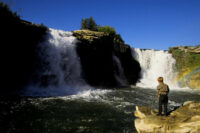City is working to get the lead out
By Jensen, Randy on July 4, 2020.
Tim Kalinowski
Lethbridge Herald
tkalinowski@lethbridgeherald.com
The City of Lethbridge will be removing the last remaining lead pipes in the community’s drinking water system over the next two years free of charge to affected property owners.
According to Doug Kaupp, general manager of Water, Wastewater and Stormwater for the City of Lethbridge, there are 84 known lead service lines in the city and about 110 other suspected lead service lines which his staff will be seeking out this summer.
“Our records suggest there are as many as 200 properties in the city, out of 34,000, that have lead pipes, have lead service lines, from the street into their house,” explains Kaupp. “Through July and August, and possibly September, we will be taking water samples from these properties’ kitchen sinks and sending them away to check for lead in the water. And we are also going to leave them with filters, a Brita filter that has the cartridge for lead specifically, so they don’t have to be concerned while they are waiting for the results. Once the tests are done, we’ll share the results with them directly, and we’ll go from there.”
Kaupp explained most of the lead lines left in the system date back to the 1930s and 1940s when copper was in short supply due to the Second World War effort, and municipalities returned to an earlier era’s technology by using lead as an alternative. That was before the toxic effects of lead were fully known.
Kaupp also said over the years the City has replaced the vast majority of lead lines which it owns in public ways, but up until now property owners would have had to bear the cost of replacing the lines in their own yards, which could be quite expensive for some. However, Kaupp said the City will replace the remaining lead service lines on these properties out of leftover funds from other CIP water projects which came in under budget, and will do so at no charge to the property owner. The estimated cost of the project will be between $0.8 million and $1.7 million depending on how many lines need to be replaced.
The federal government recently lowered its regulation on allowable lead content in drinking water from 10 micrograms per litre to five micrograms per litre. Kaupp said the City’s current lead percentage is a very safe 0.01 micrograms per litre overall, but for those with lead service lines it could potentially be higher than the federal government’s new limit. That is why, he says, the City wants to get the lead out by 2022.
“In the past we have done some sampling (of these known lines), about a decade ago, and they were all in compliance (with federal regulations),” he confirms. “There were no concerns from the lead sampling we did É But the limit has now been halved from 10 ug/l to 5 ug/l, and we’re going to be doing more testing. We’re not expecting to have big issues, but if there are it will be in those limited number of homes. We will be working with those homeowners to get the lead out of their front yards.”
Follow @TimKalHerald on Twitter
13-12




